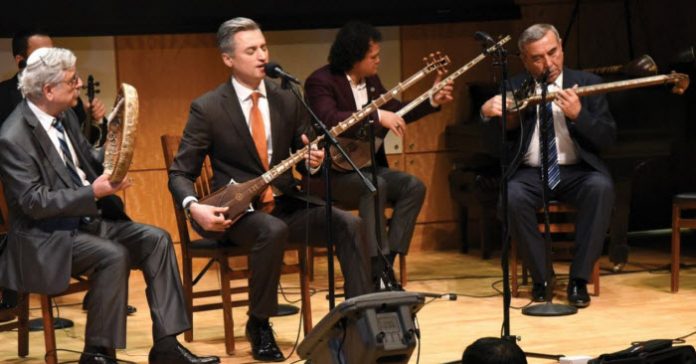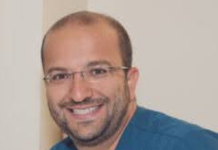When Tahir Rajabiy and Osher Barayev took the stage at the Center for Jewish History on Monday night, it was the first time the Muslim Uzbek and the Bukharian Jewish musicians had played together in decades — since they grew up together in Tashkent.
For generations, Jews and Muslims played music together in gardens, tea houses and around kitchen tables in Uzbekistan and Tajikistan.
At the Fourth International Shash-Maqam Forever concert, more than 20 Uzbek and Bukharian musicians celebrated their shared culture and traditions, singing and playing several variations of the long-necked lute, including sato and tamor, along with the ghijak, played more like a violin, and the hand-held drum called a doire. By day, many of the Bukharian musicians work in New York as barbers and drivers.
The concert, hosted by the American Sephardi Federation, was part of a two-day celebration of Shash-Maqam music, a traditional sound developed in the royal courts of the Emirs of the Bukharan empire. A classical genre, it is a complex repertoire of melodies and poetic texts set to instrumental music.
“Our idea is to continue, to bring together Jews and Uzbeks and Tajiks. Shash-Maqam is about peace,” said Rafael Nektalov, editor-in-chief of the Bukharian Times who founded the annual concert. This year, organizers honored the late Uzbek artist Ustod Yunus Rajabiy. A virtuoso musician, he recorded more than a thousand songs and melodies, and developed a written notation system for Shash-Maqam. Nektalov adds, “He was a humanitarian for whom nationality didn’t matter.”
The Rajabiy family, which traveled from Tashkent for the concert, is a musical dynasty: Along with Rajabiy’s son Ustod Tahir Rajabiy, another son, Ustod Khasan Rajabiy performed, along with Khasan’s son Aziz and grandson Yunus Jr. (Ustdod is an honorific meaning master).
Khasan Rajabiy, who directs the Yunus Rajabiy House Museum, sang alone onstage in front a large photo of his father. After rousing applause, he put his hand to his heart — a gesture to signify gratitude, love and the fact that the words come straight from the heart — and told the packed audience that he was so grateful that they understand, love and preserve this music. “You raise the spirit of the masters,” he said.
I didn’t understand a word of the singing, but I could feel the poetry, passion and deep longing in their voices. Some singers sounded more meditative, even prayerful, and others seemed to be crying from their souls or chanting layered love stories.
Some seated in the packed auditorium wore kippot, some wore the headscarves of Muslim women. Many nodded to the tunes they knew by heart; others seemed transported to distant lands.
Peter Rushefsky, executive director of the Center for Traditional Music and Dance, said, “While some edges have been fraying, it’s great to see how this event rekindles the cosmopolitan, cultural and ecumenical partnerships developed along the Silk Road.”
The concert and conference were supported by the Itzhak Mavashev Foundation, an organization founded by businessman David Mavashev to honor the memory of his father, a prominent scholar and leader of the Bukharian community in Uzbekistan and later in Tajikistan and Israel, and the author of “Memories and Folklore of Bukharians.”
When David Mavashev was growing up in the 1960s in what was then the Soviet Union, he was more interested in the Beatles than Shash-Maqam. But when some German students came to meet with his father to learn about this music, he began paying attention.
Among the three honorees at the event, Svetlana Khanimov-Levitan, was recognized for her wide-ranging support of Bukharian culture as a philanthropist and activist. She chairs the Department of Cultural Affairs at the Bukharian Jewish Congress, directs the Bukharian theater group “Renaissance” and leads an organization dedicated to helping immigrant women from all backgrounds.
Born in Samarkand, Uzbekistan, she was raised by her grandparents — her grandmother had a beautiful voice but her grandfather wouldn’t let her sing on stage, so their home became a center for a cappella singing on Shabbat. Levitan listened a lot.
“It’s important to belong to your people, to love your people, to preserve what was created. If we don’t do it, it will die.”
credit to jewishweek.timesofisrael.com














